The 1991-92 season marked the 75th anniversary of the NHL since its inaugural season and featured a 10-day player strike from the National Hockey Leagues Player Association (NHLPA) against the owners. Ultimately, the two sides came to a resolution, and the playoffs could begin. The Pittsburgh Penguins played in the Patrick Division, and their record from the regular season would not usually warrant them into this conversation. They finished with a record of 39-32-9, accumulating 87 points, and finished fourth in the division.
Before the year even started, the entire Hockey community was dealt with terrible news. Penguins head coach Bob Johnson had passed away after a long battle with Parkinson’s disease. They had just won the Stanley Cup the previous season in 1990-91, and he was poised to continue leading them in the future. It was evident that the team would play for their late head coach and carry on his legacy.
Craig Patrick, general manager of the Penguins, was very shaken up over the news. “We plan to carry on, and his goal was to win Stanley Cups; we are going to go on with that.” The team would hire Scotty Bowman as an interim head coach for the season, which certainly helped repair the loss left on the franchise. It really affected every player and staff member of this team, which led to their disappointing start to the season.
Despite this heartbreaking news, the team had to move forward and attempt to repeat the next season. They had made their biggest trade in franchise history at the previous trade deadline, acquiring Ron Francis, Ulf Samuelsson, and Grant Jennings from the Hartford Whalers. Their team stayed the same over the course of the offseason, and they would only end up adding to their group.
The 1992 Trade Deadline: Paul Coffey Shipped to Los Angeles
This Penguins team was struggling heading into the trade deadline, having won just 5 of their past 20 games. They were on the verge of missing the playoffs, and they needed to shake up their lineup. On February 19th, 1992, the Penguins traded Paul Coffey, who is still the highest-scoring defensemen in NHL history, to the Los Angeles Kings. They received Brian Benning, Jeff Chychrun, and a 1992 first-round pick (#15-Jason Bowen). Coffey would be reunited with Wayne Gretzky, Jari Kurri, and Marty McSorley.
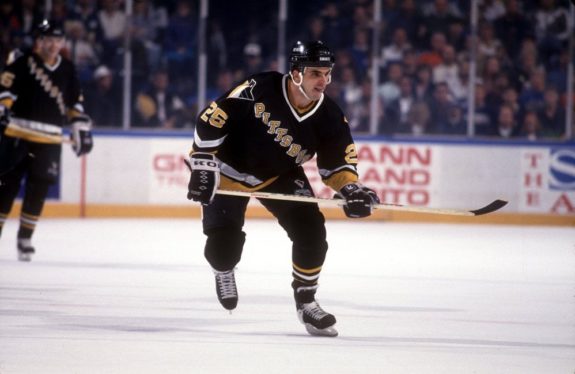
The Penguins then quickly traded Benning, and the first-round pick acquired for Coffey, along with Mark Recchi, to the Philadelphia Flyers. In exchange, they received Kjell Samuelsson, Rick Tocchet, Ken Wregget, and a 1993 conditional third-round pick (#62-David Roche).
He had 64 points in 54 games at the time of the trade, but it was time for him to move on as the Penguins wanted to acquire players with physicality and aggression. These two trades would change the course of the season for the Penguins. It would allow them to pursue some needed playoff depth in March, acquiring Bryan Fogarty from the Quebec Nordiques in change for the rights to Scott Young.
There was a lot of disappointment among Penguins fans at the beginning of the season. Jaromir Jagr, playing in his sophomore season, was suspended 10 games for bumping referee Ron Hoggarth, and Lemieux’s “garage league” comment created a rift between the NHL and their referees. The fact that the new ownership group, led by Howard Baldwin, overcame these obstacles and steered this team in the right direction was phenomenal. There isn’t a story quite like this one.
The Regular Season: Mario Lemieux Dazzled Once Again
After only playing 26 games in the previous season, Lemieux was determined to establish himself as the best player in the game. He scored 44 goals, 87 assists for 131 points in 64 games, and scored the 1000th point of his career on March 24th, 1992. He accomplished the milestone in just 513 career games, becoming the second-fastest NHL player to hit the mark, falling behind Gretzky.
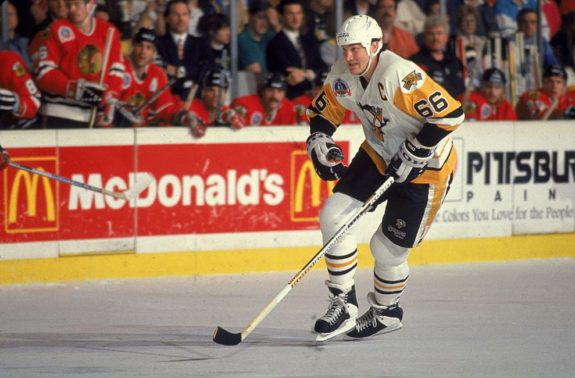
This was also a breakout season for left winger Kevin Stevens, who set a new career-high in points with 123, 37 more than the previous year. Stevens and Lemieux were the NHL’s most dynamic duo during this season and the following one, warranting the discussion of being amongst the best of all time. After Coffey was traded, Larry Murphy took on the role of the team’s best defender. He finished the season with 21 goals and 77 points, and his excellent play made him a target by the Stanley Cup Final. Francis was the eighth-highest scorer on this team with 54 points, which speaks to the level of depth on this team. The most intriguing stat came from Jay Caulfield, who played in 50 games and had zero points, but an outstanding 175 penalty minutes (PIM). His role on the team was quite evident.
After Recchi was traded, other players on the roster had to step up. Joe Mullen went from 39 to 87 points at the age of 34. This team was very top-heavy and featured some of the most prolific scorers ever to play the game. After all, hope had seemed lost for the franchise. Everything just clicked.
Lemieux won the Art Ross trophy for the third time in his career. By this point, the passing of the torch from Gretzky to Lemieux had started to take place. As for other trophies, no other Penguins player or staff would win any individual awards, but they would win the most important trophy in Hockey as a group.
Let’s talk about the magical playoff run of the 1991-92 Penguins.
Round 1 vs Washington: A Dramatic Comeback
The Penguins started their playoff run in concerning fashion. They played without Lemieux for all of the first game and a majority of the second game. They lost both and allowed six goals against in Game 2. Peter Bondra, playing for the Capitals, had five points in these two contests, and it looked like the chance of repeating would be impossible. When Lemieux is on your team, everything can be fixed by just inserting his presence into the lineup.
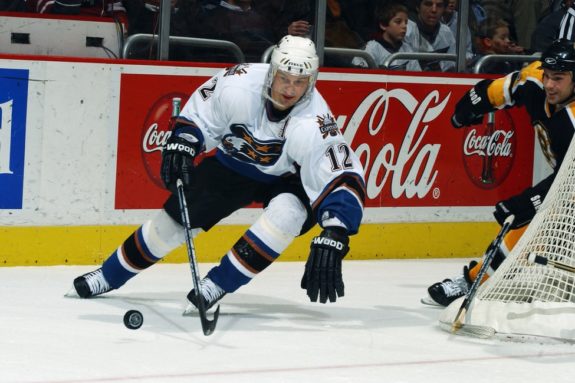
Despite playing with a sore shoulder, he scored a hat trick in Game 3 of the series, as the Pens would win the game 6-4. By the way, Lemieux put up a point on all six goals, so he was determined to drag this team back into this matchup. Scotty Bowman collected his 150th career playoff win with the victory, becoming the all-time leader in the statistic. Dino Ciccarelli scored four goals in Game 4, as the Caps would win 7-2 to put the Penguins on the brink of elimination.
Jaromir Jagr scored on a breakaway late in Game 5, as the Penguins won 5-2. There was a feeling when looking at the reaction of their bench or listening to their post-game interviews; they weren’t going to lose this series. “We are going to start a new playoff now,” said Stevens, and that quote would age gracefully. In one of the most dramatic games of all time, the Capitals held a 4-2 lead in the second period, but the Penguins surged back. They scored four straight goals, as Lemieux posted a 5 point game, and the series was going to a seventh and final game. The Penguins won 3-1, becoming the third team of that year to overcome a 3-1 series deficit and face the New York Rangers in the second round.
Round 2 vs New York: Who Can Score the Most?
Mark Messier was a scary player to face up against, having won the Hart trophy for that season. In the physical contest, the Penguins would take the first game of the series, winning 4-2. Rangers forward Adam Graves slashed Lemieux in the hands during the second game, sidelining him with an injured hand. After missing Lemieux against Washington and losing brutally, could this team play for their captain and win the game? It doesn’t help that Mullen suffered a knee injury in the same game. The Rangers came back from a 2-1 deficit to win the game 4-2. This series was just getting started.
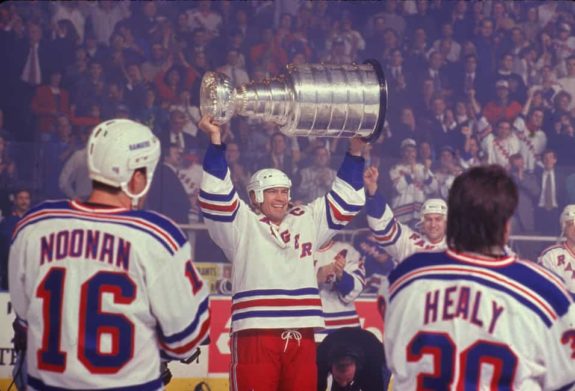
By this point, Lemieux suffered a broken hand and is the most talked-about injury in hockey. Chris King scored the overtime winner for the Rangers, as they took the series lead after Game 3. Heading into Game 4, Graves was suspended four games for his slash on Lemieux, which took him out for the remainder of the series. During the fourth contest of the series, the Penguins scored two goals in 1:15, coming from Ron Francis and Troy Loney to tie the game. In overtime, the Rangers took a penalty, and Francis deflect the game-winner to score a hat-trick, and the series was tied.
In Game 5, the Rangers tied the game at 2-2, coming from a Mike Gartner shot. The Penguins needed somebody to step up, and 20-year-old Jagr would be that guy. Coming to the net with a burst of speed, he showcased his wicked skill as he drove to the net and scored the game-winner. At this point, it was quite clear that Jagr was going to be a special player. Pittsburgh had put New York on the brink of elimination. In Game 6, the Penguins continued to score in the absence of Lemieux, winning 5-1, and Shawn McEachern would score his first career playoff goal. Tom Barrasso stopped 33 shots, and the Penguins were off to face the Boston Bruins in the Prince of Wales Conference Finals. They had eliminated the first and second-placed teams in the Eastern Conference and were not going to stop there.
Round 3 vs Boston: This Team Is Unstoppable
Coming into the series, both star players on each team were out with an injury. Ray Bourque was out with a broken finger, and Lemieux was still out with a broken hand. Who was going to step up in their absences? Once again, it would be Jagr, as he delivered the overtime winner in Game 1. This was his fourth game-winner of the postseason.
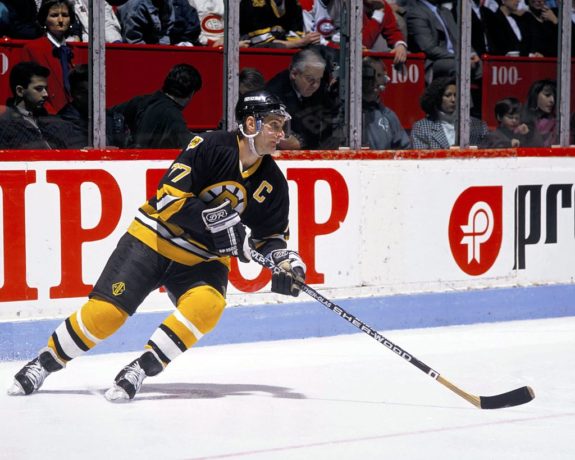
Two surprising additions were added into both team’s lineup for the second game, as Bourque and Lemieux returned for their respective teams. Mario returned and scored a goal, as the Penguins won the game 5-2 and take a two-game series lead. Coming into Game 3, Stevens had been underproducing for his standards because of Lemieux’s injury, and he broke out of it fantastically. Lemieux, Stevens, and Jagr connected on a highlight-reel goal, and Stevens scored four goals in the game. The Penguins dominated the Bruins to win 5-1, to put Boston on the brink of elimination.
With a chance to advance to the Stanley Cup Final for the second straight season, Mario dangled Bourque for a dazzling goal. His dominance with the puck cannot ever be overstated, and the Bruins were not ready to play against him. Pittsburgh swept the Bruins and it was time to go up against the Chicago Blackhawks.
Stanley Cup Final vs Chicago: Can They Repeat?
The Blackhawks and Penguins both had accumulated 87 points in the regular season, except for Chicago, which was considered a disappointment. They had won the Presidents’ Trophy in the previous season, with an outstanding 106 points, but were eliminated by the Minnesota North Stars in the first round. That loss stayed in their minds for the entire season. Now, it was time for the most important battle, the race for the Stanley Cup. The Penguins were the best offensive team in the league facing Chicago, were full of defensive specialists. These teams were quite aware of the other.
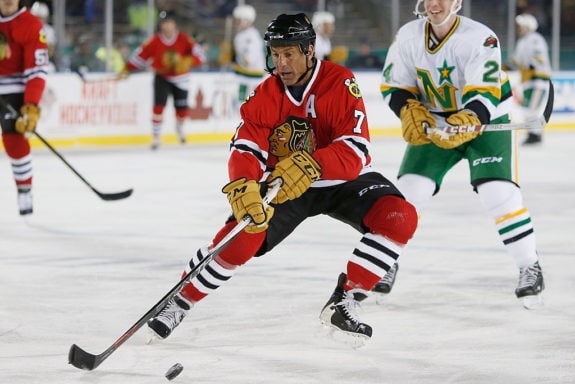
The Blackhawks took a 3-0 lead in the first game of the series, just 14 minutes into the game. The Penguins finally got on the board by the end of the first period, coming from Phil Bourque. The Blackhawks would make it 4-1 as Brent Sutter scored, but this game was far from over. Next, it is the second period, and Pittsburgh is playing their most aggressive game of the season. On the powerplay, Tocchet deflected a shot to make it a two-goal game. He was such a key addition to add to this franchise. Then, Jagr scored the most famous goal of his career, as he dangled multiple Blackhawks players and put a backhand shot on the net to tie it. It was electrifying. Lemieux scored the game-winner, and the Penguins took Game 1.
The rest of the series featured close battles between these two teams, but Pittsburgh was just too strong. The Penguins won the 1992 Stanley Cup and would win back-to-back. Mario won the Conn Smythe Trophy, putting up 34 points in 18 games. This team faced adversity, found a way to push through it, and proved their dominance in the playoffs. There is no other story like the 1992 Pittsburgh Penguins.
In my mind, this was the best-constructed team of all time. Any team with Lemieux will be up there, but the emotional factors play a huge part. They were going to win for Johnson. They won 11 games in a row to win that Stanley Cup, which will likely never happen again. Lemieux was injured, and players like Jagr and Francis stepped up when needed. Goaltender Barrasso gave them the saves needed to win every game. This was one of the most dominant seasons that fans ever witnessed, and that puts it up there as one the best in league history.